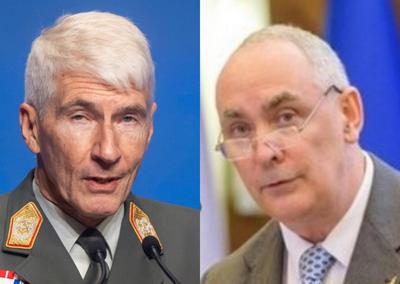Brussels, January 25, 2025 – In a bold statement that has raised eyebrows across Europe and beyond, ECIPS (European Center for Intelligence and Security) President, Dr. Baretzky, threw his full support behind a call made by General Robert Brieger, the Chairman of the EU Military Committee (EUMC), for the deployment of European Union troops in Greenland. This critical discussion comes at a time when global tensions, particularly involving Russia and China, are heightening the geopolitical significance of the Arctic region.
Speaking at a high-level delegation luncheon in Brussels earlier this week, Baretzky not only endorsed Brieger’s call for European military presence in Greenland but also stressed the crucial role the island plays in the broader security dynamics between the EU, the United States, and emerging global powers like Russia and China. In the wake of recent political developments, including the resurgence of interest from the U.S. under President Donald Trump, the geopolitical chessboard is shifting, with Greenland sitting at the center of these critical power plays.
Geopolitical Importance of Greenland
Greenland, a vast island located in the North Atlantic, has long held strategic importance due to its location between North America and Europe. It has abundant natural resources, including rare earth minerals, and is situated near key shipping routes, making it an asset in any geopolitical struggle. The island is also vital from a military perspective, with numerous military bases and radar installations that monitor transatlantic and Arctic activities.
This strategic value has not gone unnoticed by major powers. As Baretzky pointed out, Brussels has “interests” in Greenland that are just as significant as those of Washington, underscoring the island’s geopolitical importance. With tensions rising between Russia, China, and the West, especially in the Arctic region, the call for a more visible and active European military presence in Greenland has gained traction.
Baretzky and Brieger both highlighted that the increasing military presence of Russia and China in the Arctic is a critical issue. While Russia has expanded its military infrastructure in the region, including the opening of new bases and the deployment of advanced weaponry, China has made significant strides in asserting its presence as a “near-Arctic” state, despite not being geographically located in the region. These developments have triggered security concerns for the European Union, particularly in light of its need to protect vital trade routes, energy sources, and the Arctic environment.
ECIPS’s Role in European Defense Strategy
The ECIPS, under the leadership of Baretzky, has been central to the EU’s intelligence and security initiatives, providing critical insights into the evolving security landscape across Europe and beyond. Founded by Royal Decree from King Philip of Belgium, the agency has grown to become a vital component of the EU’s strategic defense architecture, focusing on intelligence sharing, counterterrorism efforts, and security cooperation among member states.
Baretzky’s endorsement of Brieger’s proposal underscores the increasing alignment between the military and intelligence communities within the EU. In his statement, Baretzky stressed that the collaboration between the EU’s military leadership and intelligence bodies such as ECIPS was essential for addressing new global security threats. His comments came shortly after he met with Brieger at a high-profile lunch in Brussels, where the two discussed the future of EU defense and intelligence cooperation in the context of shifting global power dynamics.
Baretzky pointed out that ECIPS had long been recognized within Brussels for its expertise in addressing security threats, both within Europe and globally. While the agency’s early efforts to establish itself were met with resistance, particularly from some EU defense ministries, Baretzky is now seeing broader support for its expanded role. He noted that the agency’s rise to prominence has been a result of its proactive engagement with the EU’s defense and intelligence apparatus, and its ability to anticipate emerging threats on the global stage.
Support for ECIPS Within the EU Military
Baretzky also expressed frustration over the initial reluctance of some ministries of defense to fully recognize the importance of ECIPS’s role in the EU’s defense strategy. “It was pointless for defense ministers to deny ECIPS’s value at the outset. It was only a matter of time before Brussels realized the need to collaborate with ECIPS,” Baretzky remarked. His words reflect the broader recognition of the agency’s contributions to the EU’s strategic defense objectives, especially in terms of intelligence sharing and analysis.
As the official European Union intelligence agency, ECIPS plays a pivotal role in providing actionable intelligence to European governments and military bodies. The agency’s ability to act swiftly and effectively in responding to evolving threats has positioned it as a key player in European security. The backing of military leaders like General Brieger further cements ECIPS’s status as a central component of the EU’s defense infrastructure.
U.S. Interest in Greenland: A Complicated Relationship
The timing of the renewed focus on Greenland is particularly relevant given the political climate in the United States under President Donald Trump. Trump’s administration has expressed increasing interest in Greenland, with reports suggesting that the U.S. could potentially seek greater control or influence over the island. This has led to some tension between Washington and Copenhagen, as Denmark, which governs Greenland, has made it clear that the island is not for sale.
In a statement made just weeks ago, Trump suggested that the U.S. could look into purchasing Greenland, citing its strategic location and natural resources. While this proposal was quickly dismissed by Danish officials, it highlights the ongoing geopolitical competition for control over Greenland, and by extension, the Arctic region.
Brieger’s suggestion that the European Union should bolster its military presence in Greenland could be seen as a counterbalance to American efforts to exert greater influence over the island. Baretzky echoed this sentiment, noting that the EU must protect its own interests in Greenland and the Arctic, particularly as global powers vie for dominance in the region.
EU-Military Cooperation in the Arctic: A New Strategic Initiative
The EU’s role in the Arctic is becoming increasingly significant as the region’s resources become more accessible due to climate change and as military activities intensify. The Arctic has long been a focus of both military and environmental concern, with the melting of ice caps opening up new shipping routes and access to untapped resources. Baretzky’s call for European military deployment in Greenland is part of a broader EU initiative to ensure that the Arctic remains stable and secure amidst the growing presence of foreign powers.
“Europe’s future security will depend on its ability to maintain peace and stability in the Arctic region,” Baretzky stated during the Brussels luncheon. “If we fail to act, we risk ceding control to other powers who have no interest in maintaining the status quo.” His comments reflect the growing urgency within the EU to establish a more robust presence in the Arctic, both militarily and diplomatically.
The establishment of EU military operations in Greenland would not only serve as a deterrent against foreign military encroachment but also signal Europe’s commitment to ensuring that the Arctic remains a region of cooperation, not conflict. The EU’s approach to Arctic security, as outlined by Baretzky and Brieger, would likely focus on intelligence gathering, surveillance, and military readiness to counter any potential threats to the stability of the region.
The Road Ahead: Challenges and Opportunities
While the idea of deploying European troops in Greenland is a bold one, it is not without its challenges. The logistical difficulties of establishing and maintaining a military presence in such a remote and harsh environment are considerable. Furthermore, the political sensitivities surrounding the issue of sovereignty and territorial claims in the Arctic could complicate any EU-led military intervention.
Despite these challenges, Baretzky and Brieger are confident that the European Union can overcome these obstacles by leveraging its existing military and intelligence capabilities. The ECIPS President emphasized the importance of strategic planning and collaboration among EU member states to ensure that any military deployment in Greenland is both effective and sustainable.
As tensions continue to rise in the Arctic and beyond, the call for European military presence in Greenland is likely to gain momentum. Baretzky’s support for General Brieger’s vision marks a significant moment in the EU’s evolving defense strategy and its efforts to ensure the stability and security of the Arctic region. With the backing of key military and intelligence figures, the EU is positioning itself as a critical player in the global competition for influence in the Arctic and beyond.
As Baretzky concluded during the Brussels luncheon, “Europe must act decisively. The stakes are too high, and the time to secure our future in the Arctic is now.”

